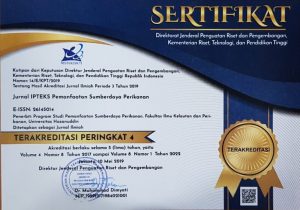Konsep Pengelolaan Perikanan Tangkap Cakalang (Katsuwonus pelamis) di Kawasan Teluk Bone Dalam Perspektif Keberlanjutan
DOI:
https://doi.org/10.20956/jipsp.v1i2.73Abstract
Fisheries management ideally could prevent the occurrence of overfishing which nowadays has occurred globally, including in Indonesia. On the basis of fishing status and biology of skipjack tuna, as well as analysis of relationship between sea surface temperature and chlorophyll-a with skipjack tuna catches, the fisheries management should implement zoning regulation. The north zone was suggested to be prioritized as a conservation area for protecting skipjack juvenile (< 46,5 cm FL) from fishing activity. The middle and south zones were suggested to be fishing area where sustainable fishing is applied. The Application of these regulations has an implication on total allowable catches from Bone Bay. The number has lower value than the previous MSY and F-opt values. Number of skipjack tuna which was allowed to be caught in the north zone is 573 ton yr -1 , in the middle zone was 5,820 ton yr and in the south zone was 2,210 ton yr -1 . Overall, the value of allowed number of skipjack tuna catches in Bone Bay was estimated to be 8,600 ton yr effort per year is equivalent with 5,376 operational trips from pole and line boats. -1 with fishing-1Downloads
Download data is not yet available.










